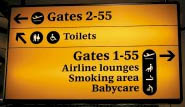
This is probably the quietest week of the year (from an internet newsletter perspective!) and so there'll be no feature column this week; instead, I offer a quasi-editorial further down in this newsletter.
UA 2 / BA 0. I mentioned last week that a reader had sent my earlier column about United Airlines and its problems to their Customer Service Department under my name, and I received a reply back a very prompt three days later. On Thursday I received a second polite reply from a second person at United. Amazing service - two replies to an email that wasn't a complaint and didn't require or request a reply! Meantime, it is 57 days since my faxed letter of complaint to BA and 14 days since my follow up fax and still no reply at all from BA. As soon as the holidays settle down, I'm filing in the Small Claims Court against BA.
Pilot Gregg wrote in response to my comments in last week's newsletter about the cost of pilots carrying guns
Incidentally, while you raised an eyebrow at the expense of a pilot firearm program, I saw no objection to making the pilots pay for it. What are all those airport taxes and fees for if not security? What other armed law enforcement officers are required to pay for their own training and duty firearms?
and also
It is highly unlikely that I will participate in the program myself since they have elected to make it as difficult as possible. What business has a crewmember with a firearm in any place other than in the cockpit - concourses, layover hotels, foreign countries, parking lots? As long as the airlines don't provide a cockpit lockbox - no gun for me.
While Gregg is correct that people who are required to carry (and potentially use) a gun as part of their core duties should not have to pay for their training, carrying a gun is not a core part of a pilot's duties and so his analogy fails. I'm more than happy that pilots should be armed, but until such time as it becomes a mandatory job requirement, I think it fair that pilots pay some share of the costs associated with their individual choices to arm themselves.
I do agree with Gregg's implied criticism of how the airlines are approaching this situation (ie nowhere secure to store their pistols). The airlines seem to be passively obstructing this move as much as they can.
|
"Changing the way the world flies as dramatically as did the introduction of the jet age" A sad tale of lost initiative Flash back to April, 2001, when in an explosion of hype not seen since the debut of the 747, Boeing launched its Sonic Cruiser (while quietly canceling its previous 'star' project, the 747X). Randy Baseler, VP of Marketing for Boeing Commercial Airplanes, said of the new Sonic Cruiser 'The question isn't whether we can sell it, but how quickly'. And Alan Mulally, Boeing Commercial Airplanes' CEO said they were serious about bringing the Sonic Cruiser to market and wasn't toying with the idea merely to steal thunder from rival Airbus Industrie's new super-jumbo A380. 'On a scale of one to ten, where ten is very serious, I'd have us at 11,' he said. 'This is about something that will change the travel experience.' Boeing estimated that out of 14,000 jetliners in service in April 2001, 5,000 of them are used for flights lasting five hours or longer - its target market for the Sonic Cruiser. Beaming next to an artist's rendering of the futuristic plane, Mulally had earlier proclaimed the new jet "could change the way the world flies as dramatically as did the introduction of the jet age." When you consider that the Sonic Cruiser was a plane offering perhaps a 10%-15% increase in cruising speed (and a smaller savings in total travel time), this was a very bold statement to make. And now, flash forward to December 2002. The Sonic Cruiser program's cancellation - long expected, and consistently predicted in this newsletter - is finally confirmed. Instead, a new marginally more fuel efficient plane is to be developed - maybe. Mr Mulally said 'I am more confident than ever over the last three or four years that this is exactly the next new airplane we ought to make'. More confident than 'on a scale of one to ten, being at an 11' as he was for the Sonic Cruiser? Wow! Mulally's confidence aside, Boeing is hedging its bets and will not commit substantial resources to the as-yet unnamed plane for some time, leaving the company the flexibility to switch gears again if it feels the need. Doesn't sound very confident to me! This is the third major change in corporate direction at Boeing in as many years. First was the commitment to a new 747X - a massive 500 seater plane to compete head on with the A380. That was cancelled in favor of the Sonic Cruiser, which was in turn cancelled in favor of a plane that they haven't even yet bothered to give a name or number! Readers may also remember my analysis on 8 November which showed that a 'super-efficient' plane that offers fuel savings of 20% would actually provide only an effective savings equivalent to 3% of the average ticket price for seats sold on that plane. Sure, greater efficiency and lower operating cost is beneficial, but it isn't something that could, to use Mr Mulally's words, 'change the way the world flies as dramatically as did the introduction of the jet age'! |
And the silliest commentary on the Sonic Cruiser's demise comes from the Seattle Times where columnist Stephen Dunphy says 'One of the problems with Boeing's Sonic Cruiser apparently was the speed — it was too fast in some ways.' He then explained that this meant that, due to its slight increase in cruising speed, airline schedules would have to be adjusted to reflect the shorter flying times, and that this 'could present a logistical reshuffle'. As I said, the silliest commentary.
Maybe still on the topic of silly , Britain is the country that bans private ownership of firearms but then witnesses a soaring increase in the rate of armed crime. And so perhaps it is not surprising to read about their angry reaction to the plan to have armed sky marshals ride their flights. British Airways and Virgin Atlantic Airways both said that the plan could risk passengers' lives and described the idea as 'irresponsible, dangerous and ill-conceived'.
A talking-head expert, Mr Chris Yates, aviation security editor at the aviation weekly magazine Jane's, said "I don't think marshals will deter suicide hijackers such as those used in the Sept 11 attacks. A suicide terrorist expects and even wants to die for the cause, so why would they worry about a shoot-out with an armed guard?
The point that Mr Yates, and his friends at BA and Virgin, fail to appreciate is that if an armed guard accelerates the timing of a terrorist's suicide and kills him before he takes over the plane and crashes it into a building, that is what most reasonable people would consider to have been a very good thing!
I wrote about the danger to airplanes posed by SAMs a couple of weeks ago. Israel announced this week that it hopes to launch a joint project with the US to develop a system to protect commercial planes from missile attack. Israel is widely believed to have some type of missile defense systems on some of it commercial planes already, and refuses to comment as to whether such countermeasures had anything to do with the missiles missing the Israeli plane that was fired upon in Kenya three weeks ago. The system is projected to cost 'hundreds of thousands of dollars' per plane - in other words, not much more than the strengthened cockpit doors are apparently costing! Sounds like a bargain to me.
This Week's Security Horror Story : When boarding a Delta Airlines (Comair) plane to fly out of Madison, WI on 24 December, a nervous passenger on his first flight in nine years smiled at the pilot and joked 'I hope you haven't been drinking'. Guess what happened next :
(a) The pilot
laughs and says 'Ha ha, that's a good joke. No-one's ever said that
to me before. Have a nice flight, sir.'
(b) The pilot looks anxious and says 'Sir, this is a very serious
matter that we really shouldn't joke about. Are you are formally
alleging that I have been drinking?'
(c) The pilot throws a temper tantrum, insists on both him and his
co-pilot being tested for alcohol levels even though the passenger swiftly
apologizes and explains he was just joking, causing the flight to be cancelled
and also resulting in the joking passenger being arrested, cited for
disorderly conduct, and now awaiting further FBI investigation.
Well, yes, of course, option (c) is the obvious choice, isn't it? <sigh> Personally I think the pilot should be told to 'get a life' and learn some people skills, and urged next time to adopt strategies (a) or (b) above.
There is an ironic postscript to this story, however. On Thursday, a Delta pilot was taken off his plane after baggage screeners smelled alcohol on his breath. A breathalyzer test showed he had a blood-alcohol level almost double that allowable. The pilot was cited for violating a city code. Delta declined to comment but said that it was 'investigating'.
Actually, the preceding passenger with his joke was quite lucky. At least he didn't get banned from the airport entirely, as happened to a person who complained after his pregnant wife had to lift up her dress in public as part of a search at Portland Airport.
A travel agent wrote to me to ask me if I could explain why it is that several years ago, travel agents lost the ability to issue advance boarding passes to passengers. The reason the airlines gave for canceling this much appreciated service was (you guessed it) 'security'. But now, although travel agents still can't issue boarding passes, many airlines are allowing passengers to issue their own boarding passes, on their own printers at work or at home, via the internet. Why is that more secure than having a travel agent issue a boarding pass? It almost seems like the airlines are trying to force people away from travel agents....
And another travel agent writes of her experiences
Just thought you might like to hear of another security snafu. I recently went on a General Tours trip to China. I had finally opened the plastic wrapped backpack that General Tours had sent with the documents and packed it as a carry on for the flight the next morning. Security did a spot check with their chemical spotter. Somehow the bag tripped the alarms. I had to go through three machines. Had two armed guards and finally the Seattle police. EVERYTHING in my bag was tested and removed.
After one hour (luckily I had arrived early), they surmised that the glue used to weld the bags must have set off the alarm. We are now warning all clients to remove the travel bags that suppliers give them, air them out thoroughly, and go one step further if there is an odor by wiping down with alcohol.
Two male passengers, unhappy with their inflight meals, said that if they had a bomb, they would blow up the plane. Overlooking the use of the word 'if', sky marshals on board promptly seized the men, who were arrested and taken off the plane at its next stop. The plane and the men were searched, no bombs were found. No details are known of what happened to the two men - perhaps they have been sentenced to ten years of eating airline meals, while being forced to sit in coach class center seats all the time!
As for next week's security horror story, let's wait to see how the new checked bag searching from 1 January will turn out. It could be a terrible mess, but let's wait and see. For now, as unbelievable as this sounds, you are advised not to pack any chocolate or cheese in your suitcases, not to stack books on top of each other, and to have your shoes prominently available at the top of your suitcase - which of course you should not lock, even if it might otherwise run the risk of bursting open if left unlocked.
Talking about checking shoes, why is it that the government is spending billions of dollars so the TSA can screen the shoes of millions of airline passengers, but, at the same time, less than 400 of the 21,000 shipping containers that arrive in US ports every day are inspected. Each is 40 ft long and easily holds the contents of a private home. Customs Commissioner Robert Bonner has said there is 'virtually no security for what is the primary system to transport global trade.'
 Lastly
for this newsletter - and for this year - some people find airports very
confusing.
Lastly
for this newsletter - and for this year - some people find airports very
confusing.
So what should a confused person, trying to decide 'Do I go left or right to get to Gate 17', do when they arrive at this sign?
Until next year (!), please enjoy safe travels.
